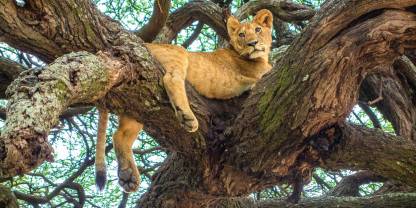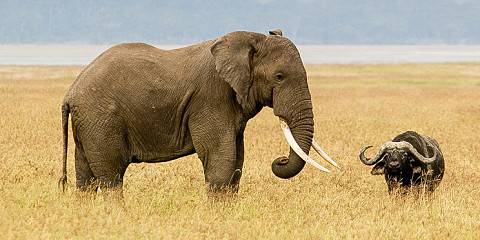Lake Manyara National Park is dominated by a shallow alkaline lake at the base of the Rift Valley . It is famous for its tree-climbing lions and large elephant herds. The park entrance leads to a junglelike , which is home to big numbers of olive baboon and . A thrilling 370m-/1,200ft-long treetop walkway offers a bird’s-eye view into this unique habitat.

-
Best Time To Go
- June to October (Easier to spot animals)
-
High Season
- July to March (The northern section gets crowded)
-
Size
- 330km² / 127mi²
-
Altitude
-
934-1,325m /3,064-4,347ft
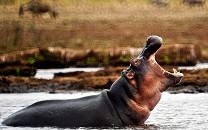 View Photos
View Photos
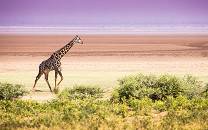 View Photos
+24
Photos
View Photos
+24
Photos
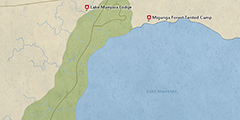 Open Map
Open Map
Pros & Cons
- Very relaxed elephants to view at close range
- Stunning scenery
- Superb birding
- Near Arusha and en route to Ngorongoro Crater and Serengeti National Park
- Activities include , night drives and a treetop walkway
- Rarely crowded in the morning
- Limited game-drive circuit
- Limited accommodation inside the park, but plenty just outside
- Crowded with day visitors (mainly in the afternoons)
Wildlife
Due to Lake Manyara’s high water level in recent years, there isn’t a game-drive track following the shore anymore. This has unfortunately changed the quality of wildlife viewing and birding considerably. However, four of the Big Five are present (rhino is absent). Animals easily seen include buffalo, elephant, giraffe, zebra and wildebeest. Look out for solitary bushbuck creeping around in the forest undergrowth and pairs of klipspringer balancing on rocks near the hot springs (Maji Moto).
More about Lake Manyara's wildlifeScenery
The park has a remarkable variety of habitats in a small area. Most notable is the dense, evergreen featuring ancient mahogany and fig trees. Other habitats include the grassy , rocky and acacia woodland, all of which can be covered in a half-day visit. Deeper into the park, a visit to the hot springs (Maji Moto) is recommended.
Activities
You’ll see a lot of different wildlife quickly on , but there are other ways to get close to nature in the park. On a night drive you’ll have a chance to find creatures that are active at night, and on a you might possibly see the big flocks of pink-hued flamingos for which the park is famous. Lake Manyara can also be explored on foot on a . And if your nerves can take it, the treetop walkway is a must.
Weather & Climate
Lake Manyara’s average daytime temperatures reach around 28°C/82°F in the Wet season (November to May). The pattern in this period is a month or two of rain (November to December), then a dry spell around the beginning of the year, followed by another stretch of rain (March to May). It’s slightly cooler in the Dry season (June to October). Early mornings are chilly, and you’ll need a jacket to keep warm.
More about the weather and climateBest Time To Visit
Wildlife viewing in Lake Manyara is good throughout the year but is best in the Dry season from June to October. The exception is March and April as these months tend to be very wet. The scenery is at its most beautiful in the Wet season months (from November to May). Many people visit the park en route to or from the Ngorongoro Crater and few people stay in or near the park. Early mornings are therefore perfect for an uncrowded experience.
More about the best time to visit
